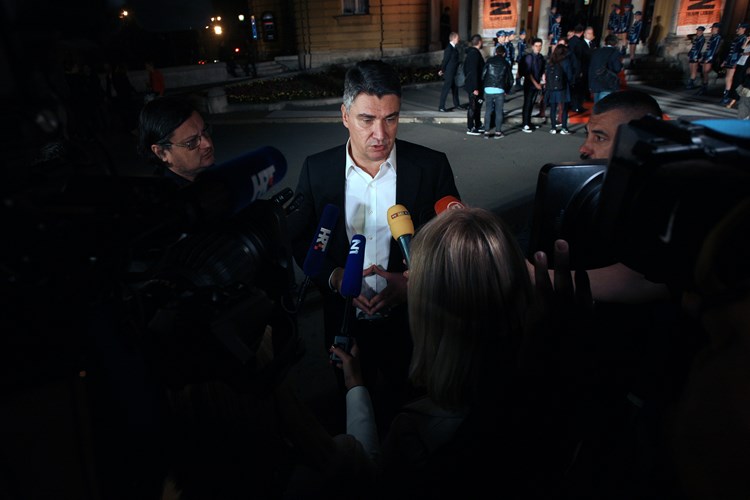- Published: 22.09.2015.
Prime Minister Milanovic: Serbia will not introduce any measures against Croatia
Prime Minister Milanovic said that Serbia would not introduce any measures against Croatia as that would mean introducing measures against the EU and stressed that Serbia should start functioning as a state and that he had offered his Serbian counterpart Croatia's assistance in their transport
"Croatia is a member of the EU. Even if it wanted, Serbia could not impose any measures against Croatia because it has an agreement with the EU. Anything Serbia intends to do would be against the EU and I am confident that they will not do it," Milanovic told reporters in Zagreb.
The PM made the statement when asked by reporters to comment on reports from Serbia that it would start applying a set of measures against Croatia if no agreement was reached in the next 30 hours on the opening of the Bajakovo border crossing, which Croatia closed to cargo traffic in the night from Sunday to Monday.
"I am among those people in Croatia who have a very high threshold of tolerance when Serbia is concerned and it will continue to be so, but there must be order. They have to start functioning as a state from the point of entry to the point of exit," he said, adding that the neighbouring country should start cooperating in dealing with the current refugee wave.
Earlier in the day, Milanovic talked with Serbian PM Aleksandar Vucic by telephone about the refugee crisis, and he described the conversation as polite, intensive and meaningful.
Milanovic said that Vucic had told him that migrants entering Serbia from Macedonia moved in Serbia as they wanted, without any control.
"I assume that it is a type of economy in Serbia, that some people make money from it, which is not good. In Croatia the situation is completely different, the state is taking care of everything, providing for those people... and transferring them to the border," the PM said.
He said that he had offered Vucic 50-100 buses to transport migrants from Serbia's southern border to the border crossing of Horgos in Vojvodina (on the border with Hungary).
Milanovic said that as long as the refugee crisis lasted, Croatia was willing to accept at least half the people arriving, "but we cannot take all of them in, we are not that naive either."
Croatia is here to offer assistance until the EU joins in. "Because, to be honest, the EU has not given Serbia anything. That must change," Milanovic said.
Asked what position he would take at an extraordinary EU summit dedicated to the refugee crisis on Wednesday, Milanovic said: "Where things cannot be forced, money should be given. That means that Turkey should be paid, talks should be held with it so that this comes to an end. There are almost two million migrants there, and only 10% have crossed over to Europe. Germany should not accept 800,000 refugees and Europe is not threatened by Islam either - that is one of the most stupid things I have heard in my political career. Unfortunately, it comes from Hungary. We can see that (the main opposition party) HDZ and Budapest are in agreement when it comes to MOL and all the other things... I will advocate this solution tomorrow together with (Slovenian PM Miro) Cerar, (Austrian PM Werner) Faymann and Angela Merkel."
Asked to comment on the HDZ's "having supported the Serbian government and asked for the opening of the Bajakovo border crossing" by calling on the government to stop the uncontrolled and illegal entry of migrants into Croatia and enable a humane and unobstructed passage of people and goods through legal border crossings, Milanovic said: "Before that, they wanted the army to be deployed along the border, now they want Bajakovo to be reopened. It's difficult to keep track of all that," he said.
A session of the Defence Council was held at the Office of the President on Tuesday afternoon, focusing on a defence plan, and Milanovic described the meeting as good.
"It was OK. I did not want that meeting because someone might have interpreted it as politicising ahead of the dissolution of the parliament but it is a document that had been worked on for months by many government agencies, including the Main Staff and its head. It is a plan of defence, a document of the utmost importance," Milanovic said, adding that he was about 20 minutes late for the meeting because of a telephone conversation with his Slovenian counterpart Miro Cerar.
(Text and Photo: Hina)
